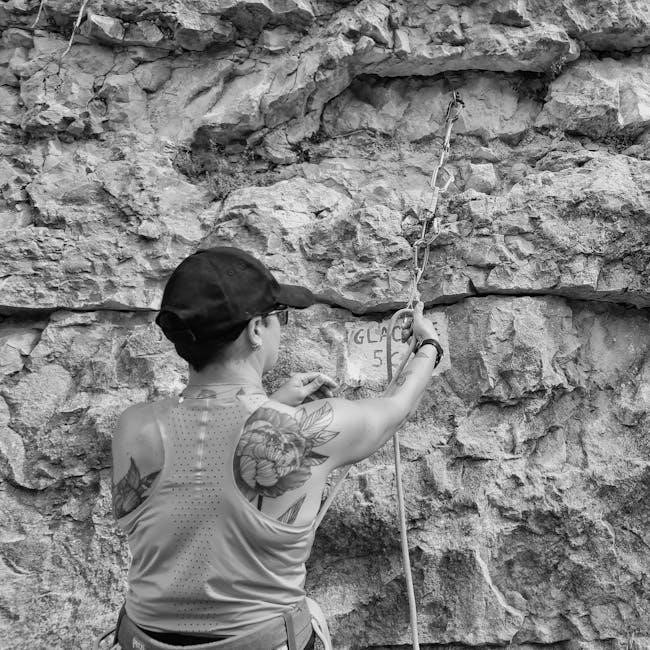Sangue de Guida, an Italian philosophy, emphasizes lineage and heritage as guiding forces in life, shaping identity and community bonds through ancestral wisdom and shared values․
1․1․ Definition and Origin
Sangue de Guida, an Italian term translating to “blood of guidance,” refers to the profound influence of lineage and ancestry in shaping individual and collective identity․ Originating from Southern Italy, this concept is deeply rooted in the belief that familial heritage and blood ties serve as a moral and spiritual compass․ It emphasizes the idea that one’s ancestors impart wisdom, values, and a sense of purpose, guiding decisions and actions across generations․ This philosophy underscores the interconnectedness of past and present, viewing family history as a foundational element of personal and communal direction․
1․2․ Cultural Significance
Sangue de Guida holds profound cultural significance, particularly in Italian heritage, where family lineage is revered as a source of identity and strength․ It reflects a deep-rooted belief in the enduring influence of ancestors, shaping traditions, values, and community bonds․ This concept fosters a sense of belonging and responsibility, encouraging individuals to honor their roots while contributing to the greater good․ By emphasizing the importance of shared history, Sangue de Guida strengthens social cohesion and preserves cultural heritage, making it a cornerstone of Italian identity and a guiding principle for generations․
1․3․ Historical Context
Sangue de Guida, rooted in Italian cultural history, traces its origins to medieval Italy, where family and lineage were central to societal structure․ The concept evolved during the Renaissance, emphasizing heritage and ancestral influence․ Historically, it was tied to aristocratic lineages, symbolizing power and continuity․ Over time, its significance extended beyond nobility, influencing community identity and collective responsibility․ This philosophy reflects a deep connection to the past, shaping values and traditions that endure today․ Its historical context underscores the enduring importance of lineage in Italian culture, bridging generations and fostering a sense of shared legacy․

The Concept of Guidance in Sangue de Guida
Sangue de Guida embodies the essence of leadership and mentorship, emphasizing the role of lineage in guiding individuals and communities through shared wisdom and collective responsibility․
2․1․ Leadership and Mentorship
Leadership in Sangue de Guida is deeply rooted in the concept of guiding others through wisdom and experience․ Mentorship plays a vital role, as elders and experienced individuals share their knowledge to nurture future leaders․ This philosophy emphasizes the importance of empowering others, fostering growth, and maintaining collective values․ Historical figures and community leaders often serve as examples, showcasing how guidance can shape both individuals and societies․ The idea of “thinking like a pancreas” from diabetes educator Gary Scheiner reflects a similar mindset—mastering skills through mentorship and applying them to real-world challenges․ This approach ensures continuity and strength across generations․
2․2․ Role of Ancestry and Heritage
Ancestry and heritage are cornerstone elements of Sangue de Guida, emphasizing the profound influence of lineage on identity and values․ This philosophy underscores the idea that one’s roots shape their purpose and responsibilities․ Heritage is seen as a collective treasure, passed down through generations, providing moral and cultural guidance․ Historical figures and ancestral stories serve as inspirations, highlighting the importance of honoring the past while building the future․ This deep connection to ancestry fosters a sense of belonging and continuity, ensuring that traditions and wisdom are preserved and cherished․
2․3․ Spiritual and Philosophical Aspects
Sangue de Guida intertwines spirituality with philosophy, viewing life as a journey guided by inner wisdom and ancestral connection․ It posits that true leadership arises from understanding one’s purpose, rooted in moral and ethical principles․ Philosophically, it emphasizes the balance between individual growth and collective well-being, advocating for self-reflection and mindfulness․ The concept also explores the idea of destiny, where one’s actions align with a higher calling․ This holistic approach fosters a deep sense of responsibility and harmony, blending personal and communal aspirations into a unified path forward․
Psychological and Emotional Aspects
Sangue de Guida explores emotional resilience, intuition, and decision-making, emphasizing the balance between personal identity and group harmony․ It fosters self-awareness, guiding individuals to embrace challenges with courage and purpose․
3․1․ Decision-Making and Intuition
Sangue de Guida highlights intuition as a cornerstone of decision-making, rooted in ancestral wisdom and cultural values․ It encourages individuals to trust their inner voice, guided by inherited knowledge and shared experiences․ This approach fosters resilience, enabling individuals to navigate life’s complexities with clarity and purpose․ By aligning choices with communal well-being, Sangue de Guida bridges personal growth with collective harmony, emphasizing the importance of intuitive decisions in maintaining balance and integrity․
3․2․ Overcoming Challenges
Sangue de Guida emphasizes overcoming challenges through collective strength and ancestral wisdom․ It teaches individuals to draw resilience from shared experiences and cultural heritage, fostering unity in adversity․ By aligning personal struggles with communal values, one gains the courage to persevere, guided by the lessons of predecessors․ This philosophy encourages problem-solving rooted in tradition while embracing innovation, ensuring that challenges are met with both wisdom and adaptability, ultimately strengthening individual and community bonds․
3․3․ Self-Discovery and Growth
Sangue de Guida fosters self-discovery by encouraging individuals to explore their lineage and heritage, uncovering deep-rooted values and traditions․ Through introspection and connection to ancestry, one gains clarity about their purpose and identity․ This philosophy promotes personal growth by aligning modern aspirations with ancestral wisdom, creating a harmonious balance between tradition and innovation․ By embracing their roots, individuals cultivate self-awareness, resilience, and a sense of belonging, ultimately leading to holistic development and fulfillment․ Sangue de Guida guides individuals to grow not just as individuals but as part of a larger, interconnected community․

Social and Community Impact
Sangue de Guida strengthens community bonds by fostering shared heritage and mutual support, encouraging collective responsibility and unity through ancestral wisdom and cultural traditions․
4․1․ Building Strong Relationships
Sangue de Guida emphasizes the importance of fostering strong, meaningful relationships within communities․ By valuing shared heritage and cultural traditions, individuals build trust and collaboration․ This philosophy encourages mutual respect and understanding, creating a foundation for lasting connections․ Through shared values and collective experiences, communities develop resilience and unity․ The emphasis on ancestral wisdom also promotes intergenerational bonds, where elders guide younger generations, strengthening family and societal ties․ These relationships are nurtured through open communication, empathy, and a shared sense of purpose, leading to more harmonious and supportive social networks․
4․2․ Community Leadership
Sangue de Guida fosters community leadership by emphasizing the role of guiding figures who embody ancestral values and wisdom․ These leaders inspire and unite individuals, promoting a sense of shared identity and purpose․ By drawing from cultural heritage, they address modern challenges while preserving traditions․ Their leadership is rooted in empathy, integrity, and a deep understanding of collective needs․ Through their guidance, communities strengthen their social fabric, ensuring harmony and progress․ Leaders in this context are not just decision-makers but also mentors, empowering others to contribute to the greater good and uphold the principles of their shared lineage․
4․3․ Collective Responsibility
Sangue de Guida emphasizes collective responsibility, where individuals recognize their shared duty to uphold community well-being and cultural integrity․ This principle fosters unity, as each member contributes to the greater good․ By valuing mutual support and accountability, communities address challenges collaboratively, ensuring resilience and harmony․ Collective responsibility also encourages active participation in maintaining traditions and solving shared problems․ It reinforces the idea that the actions of one impact the many, creating a bond of trust and interdependence․ This shared sense of duty strengthens societal bonds and promotes a culture of cooperation and shared purpose․

Educational and Developmental Aspects
Sangue de Guida blends traditional wisdom with modern learning, fostering personal and communal growth through education, skill development, and shared knowledge across generations․
5․1․ Learning from Experience
Sangue de Guida highlights the importance of experiential learning, where individuals gain wisdom by reflecting on past events and applying these insights to guide future actions․ This philosophy encourages mentorship, where elders share life lessons to empower younger generations․ By valuing lived experiences, it fosters resilience and adaptability, helping individuals navigate challenges with a deep understanding of their heritage․ Learning from experience also promotes a culture of continuous growth, where personal and collective histories become tools for shaping a meaningful and purposeful life․ This approach ensures that knowledge is not just theoretical but deeply rooted in real-world applications and communal wisdom․
5․2․ Role of Education
Eduction plays a vital role in Sangue de Guida, serving as a bridge between heritage and progress․ It emphasizes the transmission of cultural values, traditions, and wisdom through structured learning․ Formal education complements informal, community-based knowledge sharing, ensuring individuals understand their lineage and its relevance in modern contexts․ This dual approach fosters a deep connection to one’s roots while equipping individuals with practical skills for personal and collective growth․ By integrating historical insights with contemporary knowledge, Sangue de Guida encourages a balanced approach to learning, preparing individuals to honor their past while shaping a meaningful future․
5․3․ Skill Development
Skill development in Sangue de Guida is rooted in the belief that practical abilities enhance personal and collective growth․ It encourages mastering craftsmanship, leadership, and problem-solving, fostering resilience and adaptability․ By learning traditional skills passed down through generations, individuals connect with their heritage while acquiring tools to navigate modern challenges․ Mentorship plays a key role, as experienced community members guide younger generations in refining their talents․ This holistic approach ensures that skills are not only functional but also align with the philosophy’s emphasis on community, responsibility, and the preservation of cultural identity for future generations․

Modern Interpretations and Applications
Sangue de Guida’s principles are now applied in various modern contexts, including business leadership, personal development, and technology, blending ancestral wisdom with contemporary innovation and global challenges․
6․1․ In Business and Management
In modern business, Sangue de Guida inspires leadership by blending ancestral wisdom with innovation․ Leaders use intuition and heritage to guide decision-making, fostering trust and loyalty among teams․ By honoring values passed through generations, organizations build strong cultural identities․ This philosophy encourages ethical practices and long-term thinking, aligning business goals with community well-being․ Managers often draw on ancestral stories to inspire creativity and resilience, creating workplaces that value tradition while embracing progress; This approach not only enhances productivity but also promotes a sense of purpose, making it a powerful tool in today’s competitive landscape․
6․2․ In Personal Development
Sangue de Guida influences personal growth by encouraging individuals to connect with their heritage and intuition․ It fosters resilience and self-awareness, helping people navigate life challenges with ancestral wisdom․ By embracing their roots, individuals gain a deeper understanding of their purpose and values․ This philosophy promotes introspection and self-improvement, guiding personal decisions and fostering emotional balance․ It also encourages individuals to honor their lineage while carving their unique path, creating a harmonious blend of tradition and modern aspirations․ This approach to personal development empowers individuals to grow confidently, rooted in their past yet focused on the future․
6․3․ In Technology and Innovation
Sangue de Guida inspires innovation by blending ancestral wisdom with modern advancements․ It encourages developers to draw from cultural heritage while embracing cutting-edge technologies like AI and data analytics․ This philosophy fosters ethical and sustainable innovation, emphasizing responsibility toward future generations․ By integrating intuitive decision-making, rooted in lineage, tech leaders can create solutions that honor tradition while driving progress․ Sangue de Guida also promotes collaborative innovation, mirroring the community-focused spirit of its origins․ This approach ensures that technological advancements remain aligned with human values and cultural integrity, creating a harmonious balance between innovation and heritage․

Challenges and Criticisms
Cultural misinterpretations and ethical concerns arise, as Sangue de Guida’s emphasis on lineage may lead to exclusion or rigid traditionalism, sparking debates on adaptability and inclusivity in modern contexts․
7․1․ Cultural Misinterpretations
Sangue de Guida, with its deep roots in lineage and heritage, often faces misinterpretation as overly rigid or exclusive․ Critics argue its emphasis on ancestral ties can lead to cultural insularity, alienating those from diverse backgrounds․ Misunderstandings arise when the philosophy is viewed as prioritizing bloodline over individual merit or modern values․ This has led to accusations of fostering division rather than unity․ Additionally, its spiritual aspects are sometimes dismissed as outdated, clashing with contemporary views on identity and progress․ Such misinterpretations highlight the need for dialogue to bridge cultural gaps and ensure its principles are understood in a globalized world․
7․2․ Ethical Considerations
Sangue de Guida raises ethical questions about the emphasis on lineage and heritage․ Critics argue that prioritizing ancestral ties may exclude those without strong lineage connections, potentially fostering inequality․ The philosophy’s focus on inherited wisdom can also create pressure to conform to ancestral expectations, limiting individual autonomy․ Moreover, its reliance on historical guidance may conflict with modern ethical frameworks that prioritize inclusivity and equality․ Adherents, however, view it as a moral foundation that strengthens community bonds and preserves cultural integrity․ Balancing tradition with contemporary values remains a key ethical challenge for Sangue de Guida in a diverse and evolving world․
7․3․ Modern Relevance
Sangue de Guida’s modern relevance lies in its ability to adapt to contemporary challenges while preserving ancestral wisdom․ In an increasingly globalized world, it offers a sense of identity and belonging, helping individuals navigate cultural homogenization․ The philosophy encourages a balanced approach to progress, emphasizing tradition without resisting innovation; Its focus on lineage and heritage resonates with people seeking roots in a fast-paced, often disconnected society․ By blending historical values with modern needs, Sangue de Guida remains a meaningful framework for personal and collective growth, fostering resilience and unity in diverse, ever-changing environments․

Case Studies and Examples
Historical leaders and modern community initiatives exemplify Sangue de Guida’s principles, showcasing its enduring impact through real-world applications and cultural preservation․
8․1․ Historical Figures
Historical figures embodying Sangue de Guida’s essence include Italian leaders like Giuseppe Garibaldi and Camillo Benso di Cavour․ They drew strength from lineage and heritage, guiding Italy’s unification with ancestral wisdom․ Modern leaders embodying Sangue de Guida include figures like Mario Draghi, whose leadership during Italy’s economic recovery reflected ancestral wisdom and cultural resilience․ Community projects inspired by Sangue de Guida focus on preserving cultural heritage and fostering unity․ Sangue de Guida, rooted in cultural and ancestral wisdom, continues to inspire modern applications, fostering global unity and leadership while preserving heritage for future generations․ Sangue de Guida has evolved from a traditional philosophy centered on ancestry and heritage to a modern framework integrating leadership, mentorship, and community values․ While its core principles remain intact, its application has expanded across cultures and industries, adapting to contemporary challenges․ The concept now influences fields like business, education, and technology, emphasizing guidance and collective responsibility․ This evolution reflects its versatility in addressing global issues while preserving its cultural roots, ensuring its relevance for future generations․ Sangue de Guida’s principles are increasingly applied globally, transcending cultural boundaries to foster leadership, community building, and shared responsibility․ Its emphasis on ancestral wisdom and collective growth resonates in diverse societies, from Asia to Africa and the Americas․ Modern interpretations adapt its core values to address global challenges, such as sustainability and social equity․ Cross-cultural exchange has enriched its practices, allowing it to complement local traditions while maintaining its essence․ This global adaptation highlights its universal relevance, enabling it to bridge divides and unite communities worldwide in pursuit of common goals and harmonious progress․ Sangue de Guida offers a profound philosophy that bridges the past and present, emphasizing the importance of heritage, guidance, and collective responsibility․ Its universal principles, rooted in ancestral wisdom, continue to inspire individuals and communities worldwide․ By fostering self-discovery, resilience, and teamwork, it provides a timeless framework for navigating life’s challenges․ As global cultures evolve, Sangue de Guida’s adaptability ensures its relevance, making it a valuable guide for future generations․ Its enduring legacy lies in its ability to unite people through shared values and a deep connection to their roots, creating a harmonious path forward․
These figures connected personal identity to collective destiny, reflecting the philosophy’s emphasis on legacy and community․8․2․ Modern-Day Leaders
Such leaders blend tradition with innovation, illustrating how heritage shapes decision-making and community building․
They inspire others to connect personal identity with collective goals, fostering unity and progress while honoring their roots․8․3․ Community Projects
Initiatives like cultural festivals, educational workshops, and heritage preservation programs highlight ancestral values․
These projects often involve collaboration, emphasizing collective responsibility and shared identity․
They provide platforms for intergenerational knowledge transfer, ensuring traditions thrive in modern contexts․
Such efforts not only strengthen community bonds but also inspire innovation rooted in heritage․
By celebrating shared roots, these projects promote resilience and a sense of belonging, embodying the essence of Sangue de Guida․9․1․ Evolution of Sangue de Guida
9․2․ Global Applications
9․3․ Final Thoughts



